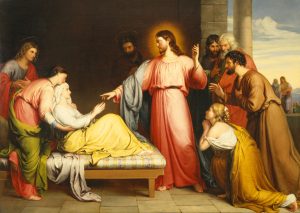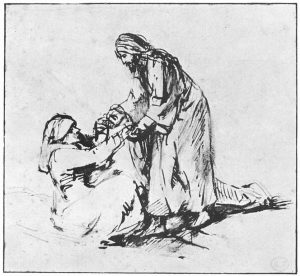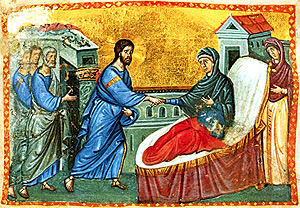Thoughts on Sunday’s Lessons for Feb. 3, 2024 (Epiphany 5B)

Christ Healing the Mother of Simon Peter’s Wife (1839). Oil painting on canvas by John Bridges (1818–1854). Birmingham (Alabama) Museum of Art. (Click image to enlarge.)
First Reading: Isaiah 40:21-31
The season of Epiphany is coming to an early end this year because Easter comes early, on March 31. Ash Wednesday and Lent are only about two weeks away. In our first reading we hear the Prophet Isaiah reassuring the people in exile that though God may seem far away, they have not been forgotten. Isaiah poetically portrays a transcendent God who is far beyond our imagining. And yet, the prophet proclaims, this mighty, eternal and all-powerful God lifts up on eagle’s wings those who wait patiently for God. God provides the power and the strength to wait and to follow God’s ways.
Psalm: Psalm 147:1-12, 21c
Sunday’s Psalm portion, excerpted from one of the six exuberant hymns of praise that bring the book of Psalms to its end, sings harmony with our Isaiah reading as it celebrates the glory of a God who is powerful and all-knowing. God is large enough to count and name even the stars of heaven, the Psalmist sings; yet God is close to the people too, guiding them home from exile and binding their wounds. God is unimpressed by strength and might, yet cares deeply for the weak and lowly, gently tending the broken and the brokenhearted.
Second Reading: 1 Corinthians 9:16-23
Pretending to be something we are not is a morally dubious action, even when we do it for a worthy purpose. But that’s not really what Paul writes in these verses when he claims to have been “all things to all people,” presenting himself in a voice separately tuned to the ears of Jews and Gentiles, believers and pagans, the strong and the weak. Following up on the advice in last week’s reading, Paul offers simple counsel to the fractious, often battling believers of Corinth: Get over your divisions. Love one another. And finally, work together in spite of any differences in order to share the Gospel’s blessings.
Gospel: Mark 1:29-39
Immediately after the events in last Sunday’s Gospel, Jesus goes from the synagogue at Capernaum to the home of his friends Simon and Andrew. There he cures Simon’s mother-in-law’s fever. Healed of her weakness, she gets up to serve them. The Greek word Mark uses for “she served” is “diekonei.” That’s the same word that Luke uses to describe those who came forward to support the Apostles as they spread the Gospel. And, of course, it is the word from which we derive our modern “deacon.” Just as Jesus cared for Simon’s mother-in-law and all who came for exorcism or healing, deacons vow to serve all people, particularly the poor, the weak, the sick, and the lonely.



